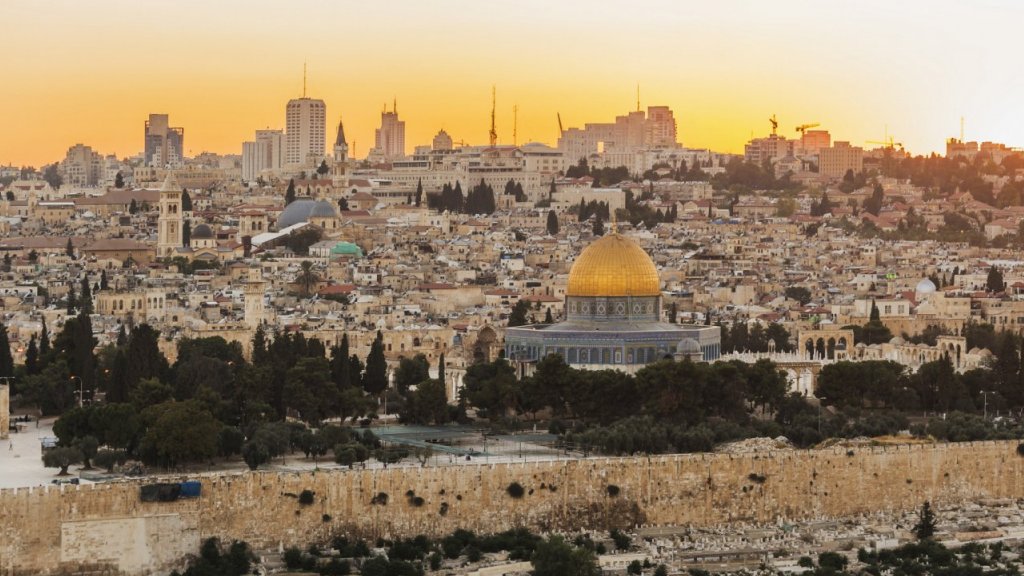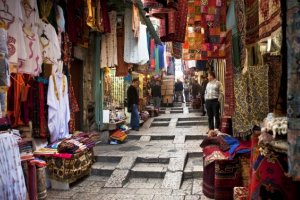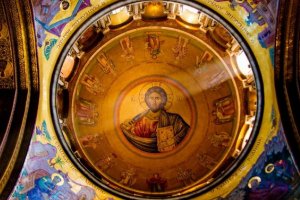With the moniker, The Holy Land, Israel already has an air of respectability and is a country that is steeped in history. A land that has a wondrous mix of biblical charm and modern feel; Israel isn't only a destination for those who are religiously devout, the Middle Eastern nation draws in travel-seekers and vacationers due to its exotic temperatures and destinations. Israel is such a varied nation because of the combining of so many different backgrounds under the Israeli identity that makes the country a destination that rises above most.

Israel
General Information
Overview:
After the Central Powers were defeated during World War I, the Ottoman Empire released its territory in what was known as Southern Syria. In what was to be called the Mandate of Palestine, the victorious British government assumed control of this region until World War II. The British and UN cancelled the mandate, and proposed the region be divided into Arab and Jewish states. This separation and the way that the region was mapped out by the UN would create tensions that have erupted for decades since. The state of Israel was formed in 1948, fought several conflicts with its Arab neighbors in the past and still suffers from flare ups of tension.
General Facts:
- Size (land area): (8,019 sq. mi). Israel is slightly larger than New Jersey
- Population: 8,049,314 (includes populations of the Golan Heights of Golan Sub-District and East Jerusalem, which was annexed by Israel after 1967)
- Border Countries: Egypt, Gaza Strip, Jordan, Lebanon, Syria, West Bank
- Elevation Extremes: Lowest point: Dead Sea -408 m, Highest point: Har Meron 1,208 m
- Religion: Jewish 75%, Muslim 17.5%, Christian 2%, Druze 1.6%, other 3.9%
- Languages spoken: Hebrew (official), Arabic (used officially for Arab minority), English (most commonly used foreign language)
Source: The World Factbook
Entry/Exit Requirements:
A valid US passport is required for an American intending to visit Israel. The passport must be valid for at least six months beyond the date of your expected departure from Israel.
Geography:
Israel is a nation located in the Middle East, with the Mediterranean Sea to the west; and is situated between Egypt and Lebanon. The territory of Israel covers 8,019 sq miles, consisting of 7,849 sq miles of land and 169 sq miles of water.
Currency:
The currency in Israel is the shekel (NIS - New Israeli Shekel) The Shekel is divided into denominations of 20, 50, 100 and 200 bank notes. The coins are divvied up into ½, 1, 2, 5, and 10 shekel coins; alongside 1, 5 and 10 agora coins. Credit cards are widely accepted. Your bank ATM card is also accepted at many Israeli bank ATMs. You do not need to change a lot of money into shekels. American money is accepted almost everywhere.
Shabbat (Saturday) in Israel:
Please bear in mind that while visiting Israel that the Shabbat is observed on Saturdays. Public offices, most private businesses and public transportation won’t operate. Even in most places an open restaurant is difficult to find. In places that are more secular, like Tel Aviv, the observance of Shabbat is only reserved for some businesses and public transportation. In very devout neighborhoods in cities like Jerusalem, the Shabbat is a holy day and is regarded as serious. In those neighborhoods, it is common for traffic to be closed on several streets and public transportation ceases to run an hour before sunset on Friday and begin again one hour after sunset on Saturday.
What to Wear:
Apart from the modest clothing that is expected while visiting holy sites like synagogues or in conservative religious neighborhoods, the clothing worn in Israel is as contemporary or in vogue as any western nation. While walking in certain religious areas in cities like Jerusalem, it is suggested that travelers adhere to the religious expectation of modesty. Men should wear long pants and women can wear shirts that are loose, but covered their elbows and skirts that hide the knees. Israel’s position in the Middle East brings with it dry and hot summers, and only mildly cool winters. Light clothes and lots of sunscreen are encouraged during the summer months. In the winter months, one should layer accordingly in case the weather changes and you can take off or put on clothes according to the weather.
Food and Drink:
The diverse and the multicultural mix that is Israel also brings forth a likewise effect on the cuisine that is enjoyed in the country. The different styles, influences and tastes are manifold in Israel. The Israeli fare is marked by regional foods, as well as the inpouring of international cuisines like any other progressive and modern nations of the west. Some of the traditional mainstays of Israeli cuisine are Falafel, a dish that features mashed chickpeas and herbs that are balled and deep-fried, usually placed within pita bread and accompanied by hummus, a sesame seed sauce and salad. Shwarma, which is sliced grilled meat, served within pita bread alongside salad. Cholent is a traditional Ashkenazi meal that includes a Shabbat meat stew and a white fish named Gefilte. For brunch or breakfast, Shakshuka is enjoyed, which is tomatoes, onions and eggs displayed on top of pita bread. Israelis drink and enjoy coffee with such fervor that is likely unmatched in most places on the globe. Cafes are located all around in its cities and delightful pastries can be had. A whole host of different regional alcoholic beverages are waiting to be tried. A favorite in the Middle East is a spirit called Arak, which is a clear beverage that is served alone or as a mixed drink with grapefruit juice.
When to Travel?
Weather by Region:
Israel has a Mediterranean climate and their weather is due to be influenced by the dryness of the near-by Arabian and Sahara deserts. In addition to the humidity of this region of the Mediterranean; Israel experiences two seasons. From April until October, there are prolonged and dry summers; and from November to March, there are moderate winters. The average temperature for Israel’s warmest months, in July and August, range from 70 to 90 °F throughout the country. Israel experiences its coldest temperatures in January when the weather drops to 42 to 59 °F, on average. The coastal regions’ climate is characterized as Mediterranean, with humidity in the summer and mild, rainy winters. In the mountains, you can expect comfortable summers and cold winters. In the Southern and Eastern areas of the country, namely near the Negev Desert region, are a desert climate with continuous dry temperatures and a sharp decrease in degrees when the sun goes down.
Israeli Holidays:
Israel uses the Jewish Calander for its observances of Holidays and most are national holidays, so it is wise to find out which ones might be present during your stay in the Holy Land. On these days business and schools are closed, while public transporation is severly limited.
Mar 12: Purim (Tel Aviv) National holiday, Hebrew
Mar 13: Shushan Purim (Jerusalem) National holiday, Hebrew
Apr 6: Yom HaAliyah National holiday
Apr 11: Pesach I (First day of Passover) National holiday, Hebrew
Apr 17: Pesach VII (Last day of Passover) National holiday, Hebrew
May 2: Yom HaAtzmaut (Independence Day) National holiday, Hebrew
May 24: Yom Yerushalayim (Jerusalem Day) National holiday, Hebrew
May 31: Shavuot (Pentecost) National holiday, Hebrew
Sep 21: Rosh Hashana (New Year) National holiday, Hebrew
Sep 22: Rosh Hashana II (New Year day 2) National holiday, Hebrew
Sep 30: Yom Kippur National holiday, Hebrew
Oct 5: Sukkot I National holiday, Hebrew
Oct 12: Shmini Atzeret/Simchat Torah National holiday, Hebrew
Travel Highlights
Jerusalem:
Founded in 3000 B.C, the holy city, Jerusalem, is the epicenter of religious devotion. This sprawling city holds some of the most sacred pilgrimage sites in Judaism, Christianity and Islam. The historic sector known as the Old City complements well with the more contemporary and lively stretches of East and West Jerusalem. The city is awash with trendy cafes, restaurants, museums and buzzing marketplaces. With over 2,000 archeological sites and 60 museums, the city of Jerusalem is a valuable artifact within itself. Venturing out into the Old City, it’s easy to become spellbound by the historical significance and religious atmosphere. Jerusalem has the distinction of being the only city on the planet that is revered by three different religions. Be it the majesty of the Western Wall which is the last remnant of the Second Temple, the Temple Mount where Muhammad ascended to heaven or the Church of the Holy Sepulchre where it is said that Jesus was crucified; Jerusalem holds significance for people of several faiths. Traveling from the Old City into the City Center feels like stepping forward in time from antiquity into the bustle of the 21st century. Home to over 1500 parks and gardens; Jerusalem feels like a complete city that is truly multifaceted and unique.
Tel Aviv and Jaffa:
A change of pace from most of Israel’s religiously reserved cities; Tel Aviv has the vitality, the modernity and the breakneck pace of cities like New York City. Tel Aviv even has a nickname that is similar to “the city that never sleeps”, which is the “the city that never stops” and it is rightly chosen. Tel Aviv is a metropolis with the spirit that rivals cities like Los Angeles and Miami. Stroll down streets like Rothschild Boulevard to experience the stunning architecture, in vogue restaurants and trendy cafes. Take a reprieve by relaxing and walking through Tel Aviv’s answer to New York City’s Central Park, Joshua Gardens. Visit Tel Aviv’s Art Gallery District to take in the achievements of Israeli artists and culture. Tel Aviv’s dynamic and vibrant night life is something that has to be experienced. For those who live in the surrounding area, Tel Aviv is the weekend destination for party goers. The city is electric with restaurants, bars, and clubs. To escape the city, all one has to do is visit the 9 mile stretch of beaches along Tel Aviv’s Mediterranean coastline or visit the ancient port of Jaffa that is now a suburb of Tel Aviv. True to its roots as one of the hotly contested cities during the Crusades between the Crusaders and the Arabs; Jaffa is full of interesting architecture, mosques, churches, fortresses and rich history.
Galilee:
The region of Galilee has tremendous drawing power to Christian and Jewish religious pilgrims because of the area’s role in the holy books of the Bible and the Talmud. Those seeking to walk in the footsteps of Jesus of Nazareth; Galilee is the prime location because this thought to be the location where Jesus sermonized and performed several miracles in the New Testament. For those who practice Judaism; Galilee was featured in the Talmud and the area where several members of the Tannaim, Rabbi Sages who performed miracles and were instrumental in forming modern Judaism, and its beliefs. One may visit the hometown of Jesus in Nazareth, the pristine Sea of Galilee, or even Safed, the location where the holy book, The Kabballah was written. Galilee region has innumerable places that hold reverence in the followers of Christianity and Judaism. Transport yourself back to the times of the New Testament and the Talmud by taking in the sites of Galilee.
Dead Sea:
Lying weightless in water under a balmy Israeli sun seems like a fantasy, but it’s a reality in the Dead Sea. Deriving its name from the inability of any marine life to live in its waters; the Dead Sea has such a great salt content to its water that you may recline with your back on the water and never go under. The Dead Sea region has 330 days of sunshine throughout the year and the summer months are the ideal times to visit. The mud that accumulates on the banks of the Dead Sea has rejuvenating and therapeutic qualities to it that is very healthy for your skin. The mud can even be purchased through local shops, giving credence to the way it works wonders for your skin. The Dead Sea is a natural wonder that should be on everyone’s bucket-list.
Masada:
Masada is the location of an ancient Roman fortress, situated on top of a high plateau in the Judean Desert, which is highly respected and thought of by Israel as representative of the resolve and courage that the modern Israelis have had in their struggles as a state. In the first century CE, the Hebrews revolted against the Roman rule in Judea and the Hebrews were beaten back by the Romans until a brave army of holdouts used the fortress at Masada as a safe haven to continue their resistance against the Romans. The story states that instead of being taken alive by the Romans, the Hebrews committed suicide and this story became powerful part of Jewish History. The fortress was named a UNESCO World Heritage Site and is regarded as an example of Jewish pride. Because of that, Masada is one of the most visited sites in Israel.
Eilat:
Situated on the southernmost area of the country and serving as a gateway to the Red Sea; Eilat truly takes advantage of its prime location on the shores of the Gulf of Aqaba. Known as a popular resort town; Eilat is blessed with an average of 360 days of sunshine a year and is in possession of many enticing beaches. Snorkel and Scuba Dive in Eilat by visiting Coral Beach which is a protected coastal area that features the northernmost coral reef on the planet. For a most unforgettable experience, travel down to Eilat’s South Beach to the Dolphin Reef. This is a Dolphin rehabilitation center that gives visitors the opportunity to snorkeling with these majestic animals. If one isn’t interested into venturing into the water; visitors can head over to Eilat’s Underwater Observatory. The observatory gives you a dual look at the beauty of the marine life of the Red Sea area by ascending up the White Tower and descending under water in two below sea level observation rooms. Come face to face with sting ray, sharks, turtles and a multitude of brightly colored fish. Eilat features a promenade that is lined with first-rate restaurants, eateries and bars that are sure to delight. With views of the surrounding Eilat Mountains and out into the Red Sea; Eilat is known to impress.
Caesarea:
Founded by the ancient ruler, Herod the Great, to honor the name of the then Caesar of the Roman Empire, Augustus; Caesarea is a city on the Mediterranean coastline that blends its deep history with upscale modernity very well. Caesarea is the locale of some of the wealthiest people in the country and includes Israel’s only 18-hole golf course, Caesarea Golf and Country Club. To delve into Caesarea’s ancient past, one only has to visit the Caesarea National Park, which is dotted with examples of Caesarea’s Roman history. Tour the roman aqueduct, mosaics, houses, palaces and Roman theater that is still used as a performance venue. Caesarea offers its visitors exquisite dining in top-tier restaurants and a chance to peruse the various galleries and chic stores in town. Visitors come to Caesarea because it combines the wealth of history that this region holds with the opulence of the modern age, and all of its comforts.
Suggested Journeys
 Israel V.I.P. Tour
Israel V.I.P. Tour12 Days / 11 Nights • Small group departures, up to 12 participants, on selected dates.
A luxurious, 5-star venture to Israel’s UNESCO world heritage destinations and scenic holy sites. Hands-on visits to Israel’s famed cultural and educational landmarks and entertainment spots, with Israel’s best-kept secrets reserved for intimate groups of up to 12 travelers. Get personal attention in an exclusive adventure exploring the best that Israel has to offer.
Featuring: Tel-Aviv, Sea of Galilee, Caesarea, Acre, Nazareth, Masada and Jerusalem.
 In the Footsteps of Jesus plus Eilat and Petra Option
In the Footsteps of Jesus plus Eilat and Petra Option11 Days / 10 Nights • Shared group departures on selected dates.
Shadow the footsteps of Jesus in a tour of the Holy Land with extension to the Negev, the Red Sea and optional visit to Petra, Jordan.
Featuring: Tel-Aviv, Galilee, Jerusalem, Bethlehem, Dead Sea and Eilat.